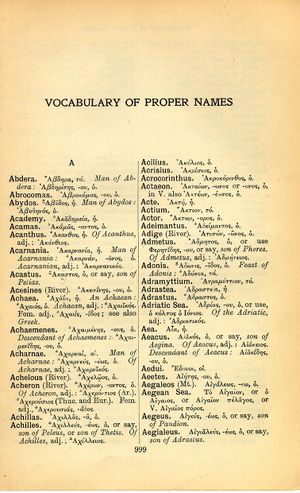Adrastea: Difference between revisions
εἰ μὴ ἦλθον καὶ ἐλάλησα αὐτοῖς, ἁμαρτίαν οὐκ εἶχον → if I had not come and spoken to them, they would not be guilty of sin
m (Text replacement - "link={{" to "link={{") |
(1) |
||
| Line 11: | Line 11: | ||
{{Georges | {{Georges | ||
|georg=Adrastēa (od. -īa), ae, f. ([[Ἀδράστεια]]), die Unentfliehbare, Unentrinnbare, [[Beiname]] der [[Nemesis]] (s. [[Nemesis]]), Amm. 14, 11, 25; 22, 3, 12. Apul. de [[mundo]] 38. Ps. Verg. Cir. 239. | |georg=Adrastēa (od. -īa), ae, f. ([[Ἀδράστεια]]), die Unentfliehbare, Unentrinnbare, [[Beiname]] der [[Nemesis]] (s. [[Nemesis]]), Amm. 14, 11, 25; 22, 3, 12. Apul. de [[mundo]] 38. Ps. Verg. Cir. 239. | ||
}} | |||
{{esel | |||
|sltx=[[Ἀδράστεια]], [[Ἀδράστειος]] | |||
}} | }} | ||
Revision as of 06:51, 22 August 2017
English > Greek (Woodhouse)
Ἀδραστεία, ἡ.
Latin > English (Lewis & Short)
Ā̆drastēa: or Ā̆drastīa, ae, f., = Ἀδράστεια.
I The daughter of Jupiter and Necessity (so called from an altar erected to her by Adrastus), the goddess who rewards men for their deeds, and who esp. punishes pride and arrogance: quod nec sinit Adrastea, Verg. Cir. 239: ineffugibilis, App. de Mund. p. 75; Amm. 14, 11.—
II A city of Mysia, later called Parium, Plin. 5, 32, 40, § 141; Just. 11, 6, 10.
Latin > French (Gaffiot 2016)
Adrastēa (-tīa), æ, f. (Ἀδράστεια), surnom de Némésis : Amm. 14, 11, 25 ; 22, 3, 12.
Latin > German (Georges)
Adrastēa (od. -īa), ae, f. (Ἀδράστεια), die Unentfliehbare, Unentrinnbare, Beiname der Nemesis (s. Nemesis), Amm. 14, 11, 25; 22, 3, 12. Apul. de mundo 38. Ps. Verg. Cir. 239.

